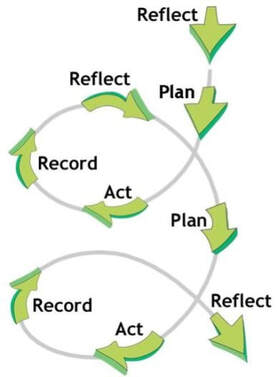Domain: Instructional Designer
Level-Specific Learning Statements
Aspiring
Researches instructional design and/or lesson planning models and/or practices in multiple contexts and compares different theories of design and/or planning practices.
Preparing
Understands research-based lesson planning models and/or practices, including the use of theories and models of development and learning.
Emerging
With a Mentor uses research-based lesson planning models/practices to plan lessons that include: (a) learning targets; (b) activities, tasks, and experiences; (c) research-based and/or evidence-based strategies; and (d) methods for monitoring/communicating student progress towards meeting learning targets.
Developing
Develops innovative instruction based on conducting and using action research that: (a) emphasizes essential concepts of content; (b) uses supplementary primary sources; (c) connects to student experience and culture; (d) meets the unique needs of diverse learners; and/or promotes student inquiry and interdisciplinary approaches.
Mastering
Coaches/Mentors aspiring, preparing, and/or emerging teachers on designing research-based instruction that includes: (a) research-based lesson planning models/practices; (b) theories and models of child development; (c) application of theories of learning; (d) conducting and using action research; and/or (c) student inquiry and interdisciplinary approaches.
Leading
Provides leadership, training, mentoring, resources, and supports for teachers and others in the larger professional community to design instruction, including: (a) research-based lesson planning models/practices; (b) models of growth and development; (c) application of theories of learning; (d) conducting and using action research; and/or (c) student inquiry and interdisciplinary approaches.
MTDS Glossary
Action Research“a quest for knowledge about how to improve” - Ferrance, 2000, p. 2
When teachers engage in action research, they begin by asking themselves questions about their practice and impact on students,. They imagine their ideal state or vision for themselves and their students. It is a self-reflective inquiry into their work with the goal of changing and improving their practice.
Teachers gather information within the context of their environment in order to identify an area of improvement or change they would like to make. They plan for the implementation of new strategies and methods of measuring their progress and observe themselves throughout the implementation, reflecting on progress and gathering evidence to support findings. The teacher then reflects on the process and makes revisions for the future. The process repeats over and over through cycles of self-assessment and adjustments to practice based on new understanding gained from the action research process. The process includes planning, taking action, observing, reflective, and then planning again. |
*Image Credit: McNiff & Whitehead, 2006
|
Research-Based Lesson Planning Models/PracticesIntentionally designing instruction to guide student learning towards mastery of learning goals is a main element of a teacher’s work. There are many ways teachers prepare learning for their students and teachers may prefer one lesson planning format or template over another. While each teacher must find what works best for them in how they organize their lesson plans, teachers should understand and follow research-based lesson planning models, which have been shown to lead to student success in learning and create what Driscoll & Carliner (2005) refer to as “a framework of thinking” (p.9). Research-based lesson planning models are based on learning theories and are connected to educational philosophies. Some examples of research-based lesson planning models to consider are noted below: .
|
Learning TargetsA lesson target is a lesson-sized standards-based goal which can be accomplished within the timeframe of a single lesson period (1-3 days). The lesson target guides instruction for teacher and students with both focusing on meeting the lesson target by the end of the period. Learning targets are specific, measurable, actionable, relevant, and timely (SMART). Learning targets are derived by unwrapping content standards and then used to: (a) guide the development of formal and informal assessments; (b) plan instruction; and (c) facilitate self-directed student learning. A lesson target provides students with a clear understanding of what they need to know and be able to do in order to be successful. Some learning targets (especially those that extend beyond 1 class period) may be accompanied by more detailed *success criteria. Learning targets are sometimes written as “I Can” statements. Theories of LearningUnderstanding how students learn, acquire knowledge and skills, is fundamental to the role of a teacher. There are many different theories of learning. Some of the main theories worth investigating are:
|
Missouri Teacher Development System July 2022
